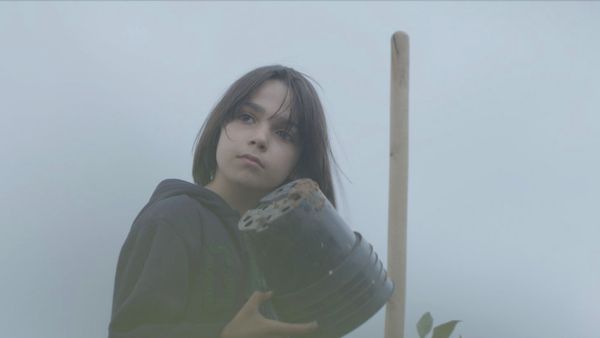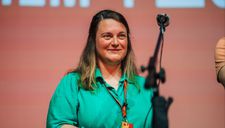 |
| Blueberry Dreams. Elene Mikaberidze: 'I added a bit of artistic flair because I love working
with visuals' Photo: Courtesy CPH:DOX |
The film tells the story of a Georgian family farming blueberries in Mingrelia, near the border of the occupied region, Abkhazia. In this interview conducted at Kutaisi International Short Film Festival (which also shows feature-length works such as Blueberry Dreams), Mikaberidze shares the journey behind the film and her reflections on its challenges.
How accidental was your encounter with the family who became the subject of your film?
I was filming other children near the border of occupied Abkhazia and staying with different families. Due to Covid, hotels weren’t available, so I stayed at the Meladze family’s guesthouse. On the first day, I realised I needed to stay longer, and eventually, the entire documentary became about them.
How did your vision of the documentary change during filming?
Initially, I wanted to film my cousins in Abkhazia, but I wasn’t given a permit, and during Covid, the border was completely closed. I started looking for other stories and stumbled upon the Meladze family and their plantation. That’s when I realised the direction the film needed to take – I added a bit of artistic flair because I love working with visuals.
The film critiques the state aid program “Plant the Future,” which aims to support beginner farmers. In your opinion, what are the problems with this program, and what should it actually achieve?
 |
| Director Elene Mikaberidze Photo: Odesa International Film Festival |
Which scenes were the hardest to capture logistically and emotionally?
Emotionally, it was tough to film Nino [the mother] talking about giving birth to her eldest child. I filmed it alone so she would open up. Logistically, filming the children was challenging – they never stayed in one place. We were constantly chasing them with the camera, waiting for something to happen.
Did you give any directions to the family during filming?
Once, I asked Soso [the father] to talk to the children about the political context. I needed that for international audiences to understand the significance of this land. Other than that, I didn’t give directions. Lazare [the son] sometimes suggested filming him, but nothing like that made it into the final cut.
How do you compare yourself to the children you filmed?
I’m not much like Lazare or Giorgi, but they remind me of my cousins who live in Abkhazia, and that’s why I chose to film them. I’m half-Georgian, half-Abkhaz. After the war, I moved to Belgium, and for a long time, I couldn’t speak. I was very shy, constantly afraid, and haunted by memories of the war. Giorgi and Lazare are growing up surrounded by nature and animals, while I grew up in Brussels, in an apartment where I had never even seen a cow in the wild. That was a wonder to me, and now I actually dream of owning a farm.
How is the Meladze family today?
The aid program they’re part of is a four-year deal. They pay interest for four years, and then have to repay the loan in full. But there’s no way they’ll manage that. Soso remains optimistic, but I’m worried. We’re planning to raise funds through a platform called Sharedoc to buy a tractor for Soso to ease his work.
Are you working on new projects?
I’m working on a documentary called This Is Not My Sea, exploring Alzheimer’s and war. We’ve been filming for about a year. I’m also working on a feature film with producer Tekla Matchavariani, which we’ve been developing for nine years.
Does Soso still believe in the future of his blueberry fields?
As he tells Nino at the end of the film, “Give me a little time.” He believes in it and loves his land, even calling the blueberries his daughters.





















